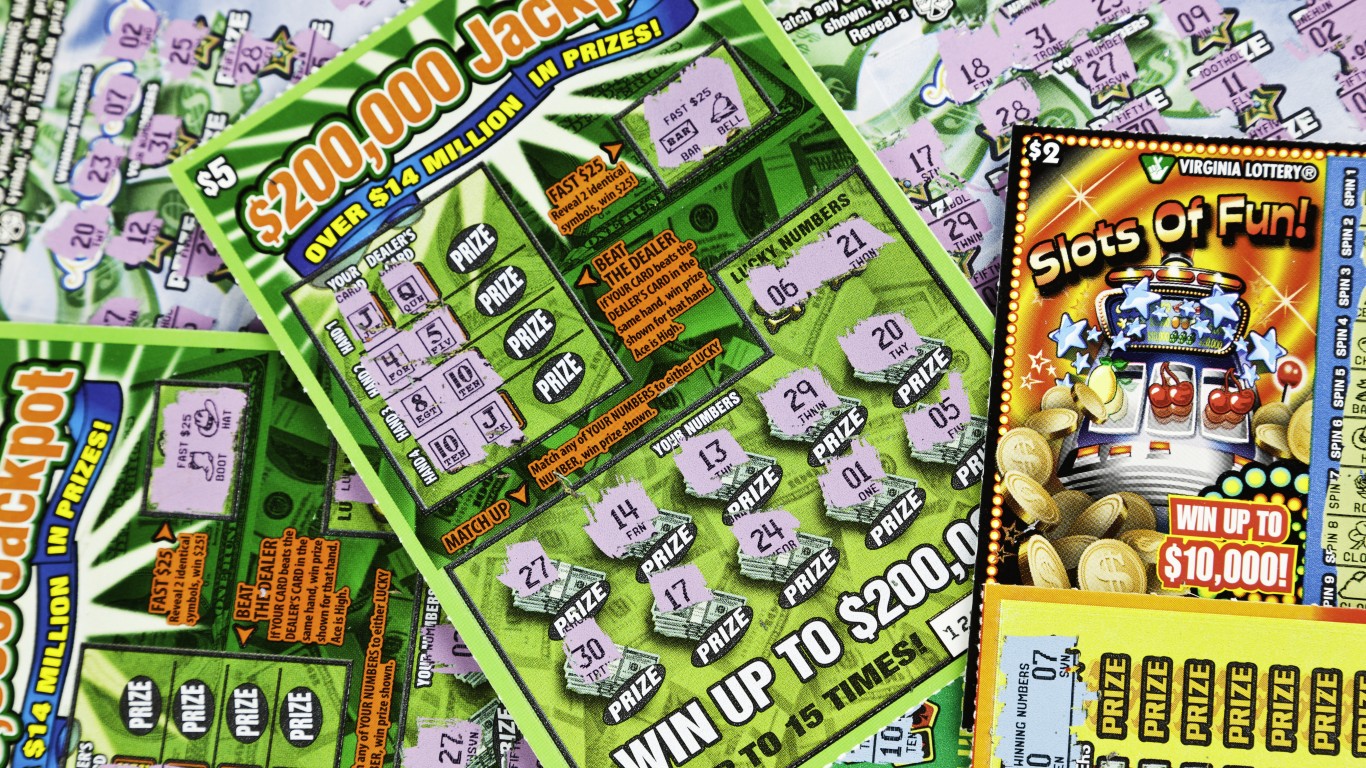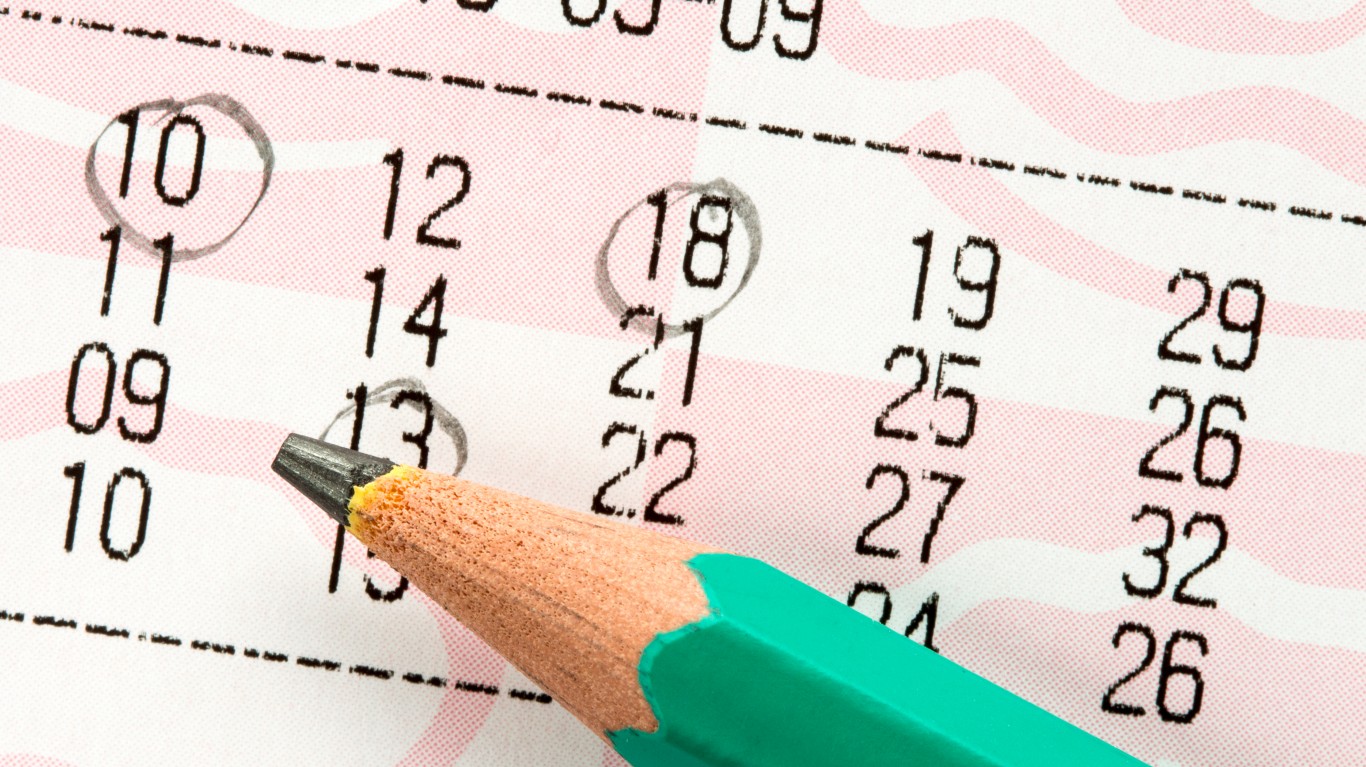Personal Finance
Buying a Lottery Ticket Might Be Worth It - Even Though You Won't Win

Published:

“What would you do if you won the lottery?” That’s a conversation-starter everyone enjoys. Imagine having millions of dollars dumped into your bank account and being able to fulfill all your material dreams while still quitting your job and living a life of leisure. Imagine being able to erase not only your own debt, but that of your friends and family, too. What about giving to charity to move forward causes you care about and change the lives of thousands of people?
That’s the fantasy. In reality, the chances of winning a substantial amount of money are infinitesimally small. Playing the lottery can be addictive and wasteful, and even winning can ruin your life in unexpected ways. Despite all these negatives, are there any reasons you might still want to play the lottery?
24/7 Wall St. Insights

45 states plus Washington D.C., Puerto Rico, and the U.S. Virgin Islands all run lotteries. There is no official national lottery, but the states cooperate to offer some combined lotteries with larger jackpots. Mega Millions and Powerball two of the largest and are found in almost the whole country. Anyone can buy lottery tickets, including foreigners and non-U.S. citizens. It is possible to buy tickets in person at retailers or to play the lottery online.

The lottery has been described as a “voluntary tax.” Thomas Jefferson thought a national lottery would be a preferable way of raising revenue than taxation. However, given the demographics of the citizens who play most often, and how they play, opponents have described it as a “tax on the poor.” People who know how to manage money do not play, at least not excessively, while some of the most desperately poor and ill-informed spend their meager resources on this false hope. Some people become genuinely addicted to it, ruining their lives and those of their families.

The biggest lottery payout in U.S. history was a Powerball jackpot of $2.04 billion. But the lottery might just be the worst possible way a person could invest their money because the odds of winning are infinitesimally small. The odds of winning the Mega Millions or Powerball are about 1 in 300 million. The U.S. has a population of 333 million. So the odds of winning the lottery are similar to correctly guessing one person’s address out of almost everyone in the country.

70% of lottery winners lose all their money within 7 years. Interviews with thousands of them have shown many of them to be desperately unhappy and wishing they had never won. Family, friends, and strangers hit them up for money incessantly and relationships are destroyed. They often choose an extravagant lifestyle that burns through the money quickly. They fall victim to scam artists and poor investment schemes. Some have even been murdered for their money. Many of them very much wish they had never played.

All these negative repercussions lead to the obvious conclusion it’s better not to play the lottery . . . if you are doing it in a delusional and excessive way. If you actually think you have a chance of winning the jackpot (which would be like getting hit by lightning dozens of times), and if you put money into it you need for other things, then it’s a problem.
But there are some reasons buying a ticket now and then could be a reasonable choice for some people. For example:
Human psychology works in such a way that the anticipation of something often produces a stronger emotion than the reality of it. So it’s possible that just buying that ticket and waiting for the winner (who is never you) to be revealed actually will, in the end, make you happier than if you won the lottery and had to deal with the avalanche of problems it would bring.

But if you seriously want an easy way to make a fortune, invest that lottery money in a growth mutual fund. If you invested a dollar a day for the next 40 years at a 10% rate of return, you’d end up with $163,000, having spent just $14,600 of your own money. And while there is always some risk in stock investing, the historical performance of the market, the diversification of a mutual fund, and the long time frame of this hypothetical investment would make it pretty much guaranteed, no luck needed.

If you worked at an entry level job for $13 an hour, 40 hours a week for 40 years, you’d have $1,081,600 running through your hands in a lifetime. Though you wouldn’t have it all at once, as a “gradual millionaire” you also wouldn’t be able to lose it all on some get-rich-quick scheme or deadbeat relatives. So in reality, instead of asking “what would you do if you had a million dollars,” a more practical question is: “what are you doing with the million dollars you’re earning?”
Retirement planning doesn’t have to feel overwhelming. The key is finding expert guidance—and SmartAsset’s simple quiz makes it easier than ever for you to connect with a vetted financial advisor.
Here’s how it works:
Why wait? Start building the retirement you’ve always dreamed of. Click here to get started today!
Thank you for reading! Have some feedback for us?
Contact the 24/7 Wall St. editorial team.